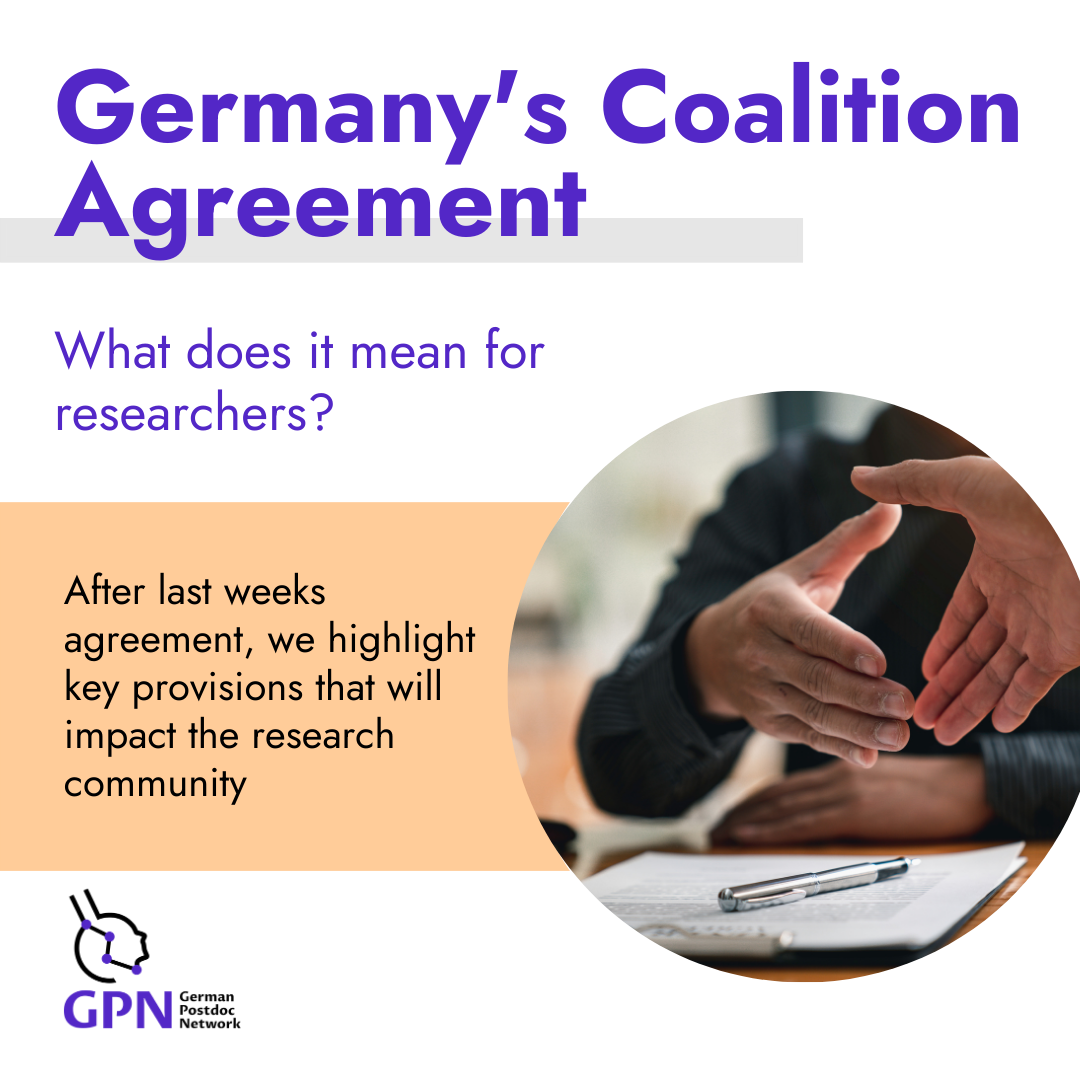Germany's Coalition Agreement:
What Does it Mean for Researchers?
April 2025
Last week, the Christian Democratic Union (CDU), the Christian Social Union (CSU), and the Social Democratic Party (SPD) announced a coalition government deal in Germany. The agreement, which outlines the government's policy priorities for the next few years, contains several key provisions that will have a significant impact on research in Germany. In this blog post, we'll break down the most relevant points for the research community, highlighting both the benefits and the challenges that lie ahead.
A New Ministry for Research and Technology
One of the most significant developments in the coalition agreement is the planned restructuring of the Ministry of Research and Education. The ministry will be split, with a new entity focused on research, technology, and aerospace being established. Meanwhile, the education portfolio will be transferred to the Ministry of Family, Seniors, Women, and Youth.
The new ministry will have a wide-ranging mandate, encompassing the promotion of research and development, the support of start-ups and small and medium-sized enterprises (SMEs), and the development of a national innovation strategy. Additionally, the ministry will be responsible for coordinating Germany's research and innovation policy with the European Union, ensuring that the country remains at the forefront of international research and innovation efforts.
Increased Funding for Research
The coalition agreement also includes a commitment to increase funding for research in Germany. The government has pledged to increase the budget for research and development, with a focus on supporting research in key areas such as artificial intelligence, biotechnology, and renewable energy.
The increased funding will be used to support a range of research initiatives, including the promotion of interdisciplinary research, the support of early-career researchers, and the development of new research infrastructure.
Improved Working Conditions for Researchers
The coalition agreement also includes a commitment to improve working conditions for researchers in Germany.
The coalition parties intend to amend the German academic fixed-term contract act (WissZeitVG) by mid-2026 and implement a middle management strategy. They also aim to introduce incentives for departmental structures and establish new job profiles. Another important provision is the extension of protection clauses for researchers on third-party funded projects.
International Cooperation
The coalition agreement also includes a commitment to strengthen international cooperation in research and innovation. The government has pledged to increase funding for international research collaborations and to promote the development of new technologies and industries through international cooperation. Additionally, the government has promised to ease the visa process for researchers from outside of the EU and to promote the freedom of research in Germany.
Possible Challenges Ahead
While the coalition agreement contains many positive provisions for early-career researchers, there are also challenges that lie ahead. One of the main concerns is the potential for friction losses due to the split of the ministries. Additionally, the government's commitment to increase funding for research in specific areas may lead to a decrease in funding for other areas. Finally, the unclear implementation of the agreement's provisions may create uncertainty among researchers.
Conclusion
The coalition agreement is a significant development for early career researchers in Germany, with both benefits and challenges ahead. While the emphasis on science and innovation is welcome news, the potential impact on the broader research community and the challenges of restructuring could create friction.
As the research community in Germany looks to the future, it's essential to engage with policymakers and stakeholders to ensure that the needs and concerns of early career researchers are heard. By working together, we can create a research environment that is supportive, inclusive, and conducive to innovation and excellence.
Sources in English:
- DW: "Germany: CDU, CSU and SPD announce coalition government deal" (Link here)
- Science: "Germany creates super-high-tech ministry for research, technology, and aerospace" (link here)
Sources in German:
- Wissenschaftsrat (2025): Allianz-Koalitionsvertrag (link here)
- Forschung-und-Lehre (2023): Koalition verspricht Fokus auf Wissenschaft und Innovation (link here)
- Koalitionsvertrag (2025): Koalitionsvertrag zwischen
CDU, CSU und SPD, 21. Legislaturperiode (link here)
Relevant upcoming event (in German):
The next UniWiND Lunch Session (7 May 2025) features a Q&A with renowned science journalist Jan-Martin Wiarda, focusing on current challenges and future directions in German science policy. Topics may include the role of the new federal government, research funding, the WissZeitVG debate, and international influences on German academia. The event is organized in cooperation with Universität Hamburg.
For more information click here!






